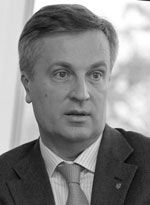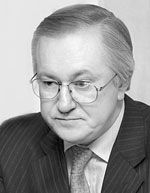Recent events make one wonder about the relations between Ukraine and the United States, about how Washington sees the situation in this country.
Last week, Yevhenia Tymoshenko spoke in the Senate; Hillary Clinton met with Viktor Yanukovych during a conference in Munich. Philip Gordon, Assistant Secretary of State for European and Eurasian Affairs, visited Kyiv several days ago.
Gordon’s officially stated purpose was to meet with Ukraine’s senior officials and opposition leaders, in order to discuss a range of common interests.
After meeting with Assistant Secretary Philip Gordon, Prime Minister of Ukraine Mykola Azarov spoke about the importance of Ukraine-US strategic relations, that Ukraine gave the US its highly enriched uranium and froze dual-use equipment supplies to this end, despite considerable economic losses.
After meeting with US businessmen in Ukraine, Gordon reiterated their problems, saying there are obstacles on the road leading to larger US investments in Ukraine, especially in terms of tax, regulatory, and customs authorities, because they are holding back the process.
Gordon met with opposition leaders Valentyn Nalyvaichenko, Arsenii Yatseniuk, Oleksandr Turchynov, and Borys Tarasiuk. Among those present were US Ambassador John Tefft and embassy and State Department officials.
The Day asked the Front for Change’s press service for comment and received a brief formal reply: “Matters pertaining to political persecution, specifically the issue of Yulia Tymoshenko’s release from prison, were discussed, also the 2012 parliamentary elections in Ukraine.”
Valentyn Nalyvaichenko and Borys Tarasiuk offered more information.
COMMENTARIES
Valentyn NALYVAICHENKO, chairman of the Political Council, Our Ukraine:
“We primarily discussed civil society and NGO support in Ukraine. Mr. Gordon had met with NGO representatives, so we agreed that the public sector may play the key role in securing fair elections, in preparing local observers and preventing mass falsifications. The presence of foreign, particularly US observers, will be important.
“Most importantly, the opposition must act as a team, particularly in working out a single slate and getting support for a single opposition candidate in each majority electoral district, with en eye to the local electorate’s opinion.
“I stated my vision of this slate with new names. We have to help promote entirely new figures, people from the public sector, public opinion leaders, journalists, business managers willing to give politics a try. In other words, this should be a united opposition slate showing new names and ideas. New political figures are the only chance for actual reforms in Ukraine.”
Borys TARASIUK, leader, People’s Movement of Ukraine (Rukh):
“It is true that Ukraine has attracted the keen attention of various US institutions of late, including Senate hearings, with a large Ukrainian political delegation visiting Washington and attending the National Prayer Breakfast. What’s behind all this?
“I think one reason is the US administration’s anxiety about official Kyiv’s current policy. Another reason is that Washington is probably revising its policy in regard to Ukraine. To make a decision (you must know that a draft resolution concerning Ukraine has been submitted to Congress), one must have as much information as possible – which is precisely the reason behind such keen US interest in Ukraine. The United States is a country accustomed to thinking in strategic terms. It keeps helping Ukraine become an influential European country. Needless to say, the US hates to see this largest European country become a puppet on Russia’s strings. The US wants Ukraine’s political leadership to embark on a road leading to genuine democracy, putting an end to violations of human rights and releasing opposition leaders from jail. This explains [Washington’s] interest in contact rather than meeting the Ukrainian president or other ranking bureaucrats’ ambitions.
“Philip Gordon’s visit to Kyiv was one of the US administration’s final attempts to get Ukraine back on democracy course. Gordon had accompanied Hillary Clinton on her trip to Munich and planned two visits, to Bulgaria and Ukraine. In Ukraine, he met with the prime minister, with the head of the presidential administration, and with a deputy foreign minister. His meeting with people who represented Ukraine’s civil society and those of the Dictatorship Opposition Committee received far lesser national media’s coverage. This meeting related to the general context of Ukraine-US relations and the situation in Ukraine, in regard to major political events in both countries, specifically the presidential campaign in the US and the parliamentary elections in Ukraine. The US elections will start a week after the elections in Ukraine and this will in a way determine Washington’s attention to the parliamentary elections in Ukraine.”









